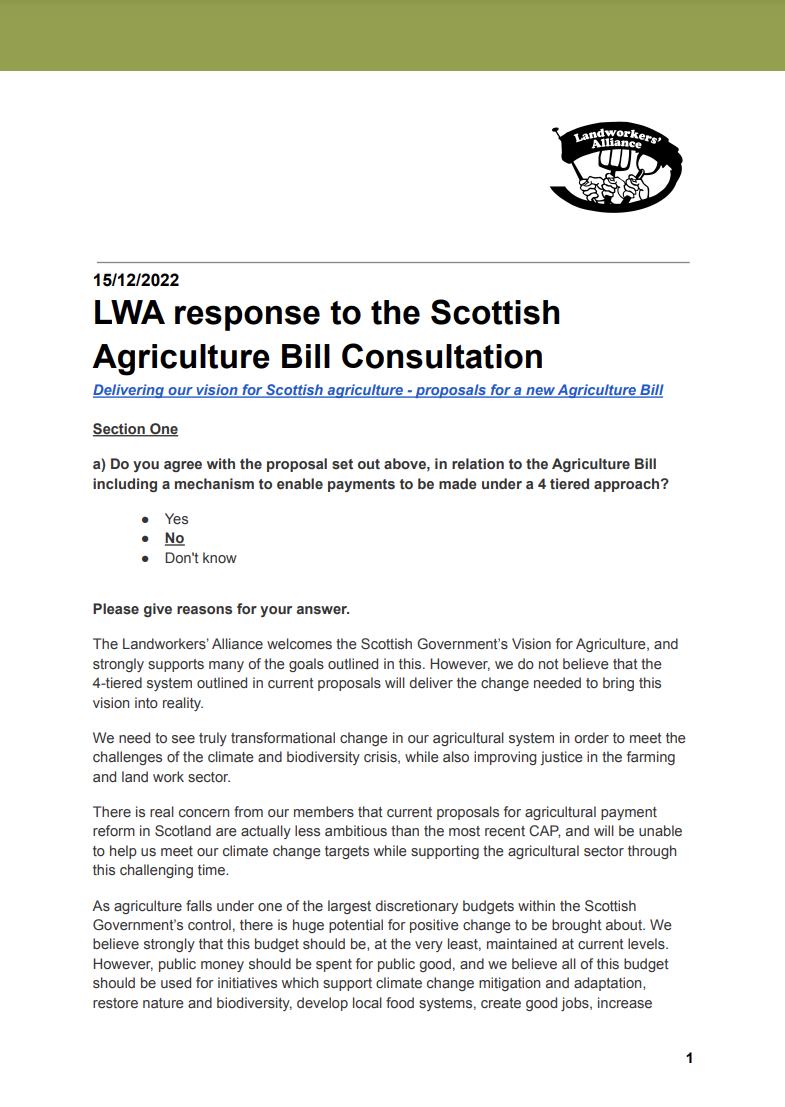In early winter 2022, we responded to the Scottish Government’s consultation on the upcoming Agriculture Bill. This bill will replace EU Common Agricultural Policy legislation, and offers an opportunity to transform the farming sector in Scotland. Our full response to this consultation, based on members perspectives and experiences, can be found yma.
If you don’t fancy the long read (we ended up writing almost 15,000 words!), our main points are summarised below:
Greater ambition is needed
Truly transformational change in our agriculture system is needed in order to meet the challenges of the climate a biodiversity crisis, while also improving justice in the agricultural sector. While we support many of the goals outlined in the Scottish Government’s Vision for Agriculture, we are concerned that current legislative proposals will not bring this vision into reality. We are calling for greater ambition and imagination to deliver a rapid and just agricultural transition, allowing us to meet our emissions reduction targets while supporting the land work sector through this challenging time.

Small farms and crofts must be better valued and supported
Current proposals continue to rely heavily on an area-based payment system, in which farmers receive funding per hectare of land. Area-based payments discriminate against small-scale farmers and crofters, and have resulted in a positive feedback loop in which owning more agricultural land leads to more public support, which in turn leads to more possibilities to finance and acquire more land. There is no just reason why those with larger amounts of land should receive higher levels of ‘income support’ than those with smaller amounts of land. We propose instead a system of universal basic income for farmers and crofters, awarded equally to all those who are actively farming. If area-based payments are to continue under the new Agriculture Bill, then a robust system of mandatory capping and redistribution of payments is required to ensure public funds are allocated in a cost-efficient and just manner. In addition, we advocate strongly for the removal of the 3ha minimum size threshold for farms to receive financial support, and ask that the bill ensures all new support schemes are accessible to small scale producers.
Transitioning farm management practices towards agroecology should be prioritised
Environmental sustainability, both in terms of nature conservation and climate change mitigation, will be a big focus of the future payments system. In our consultation response, we highlighted the need for support to focus on improving agricultural management practices, rather than on removing land from production. Agroecological farming practices support nature and wildlife, sequester carbon, create jobs and produce healthy local food. We emphasise that taking some land out of production while intensifying harmful practices elsewhere on the farm is a false solution to the crises we face. In addition, we recommend that practices such as agroforestry, which integrates tree planting and food production, should be particularly encouraged under the new payment system.
Horticulture must not be forgotten
We were concerned that current proposals for the Agriculture Bill do not mention horticulture, and it is currently unclear where fruit and veg production will fall under the new payments system. Small-scale horticulture and market gardens, in particular, produce a huge amount of food per acre, often operating viable business on very small areas of land. Horticulture should be explicitly supported under the new payments system, with direct targeted at market gardeners who provide food for communities via hyperlocal supply chains.
Support for new entrants into farming is essential
Current proposals offer no support for new entrants to agriculture. In our response, we highlight the need for targeted support for new entrant farmers to address the challenge of an ageing farming population, and to improve diversity in the sector. To be effective, this support must include capital grants for starting up, advice and mentoring, and improved access to land. Supporting new entrants will have wide-reaching benefits for agriculture in Scotland, including revitalising rural communities, bringing new ideas and energy into farming practice, and ensuring generational renewal.
We will be continuing to campaign on these issues as the Agriculture Bill makes its way through parliament. Please get in touch with out Scotland campaigns coordinator Tara at tara.wight@staging.landworkersalliance.org.uk if you would like to learn more.

